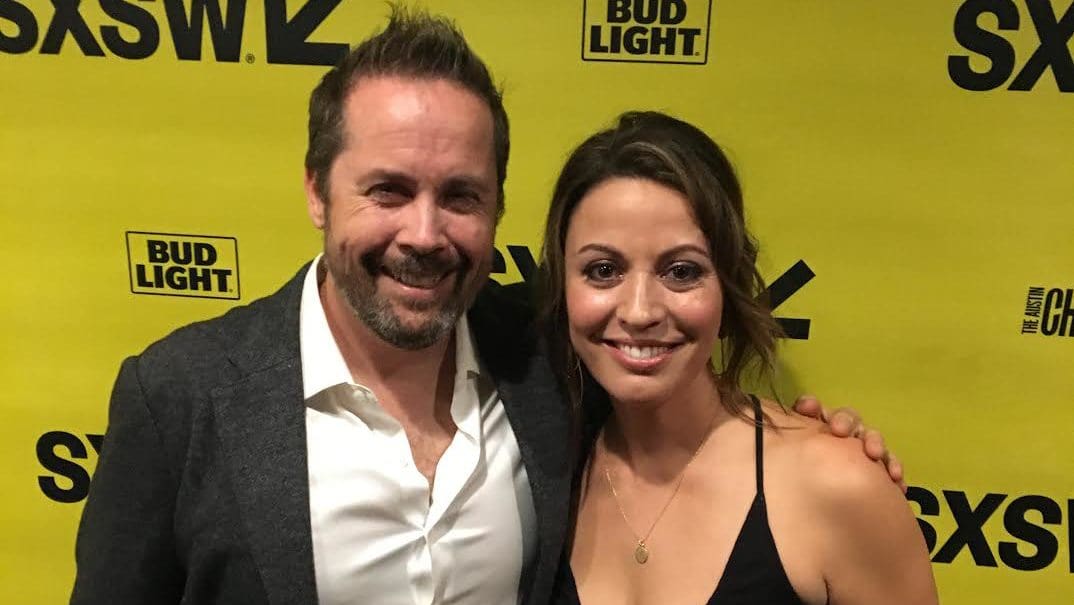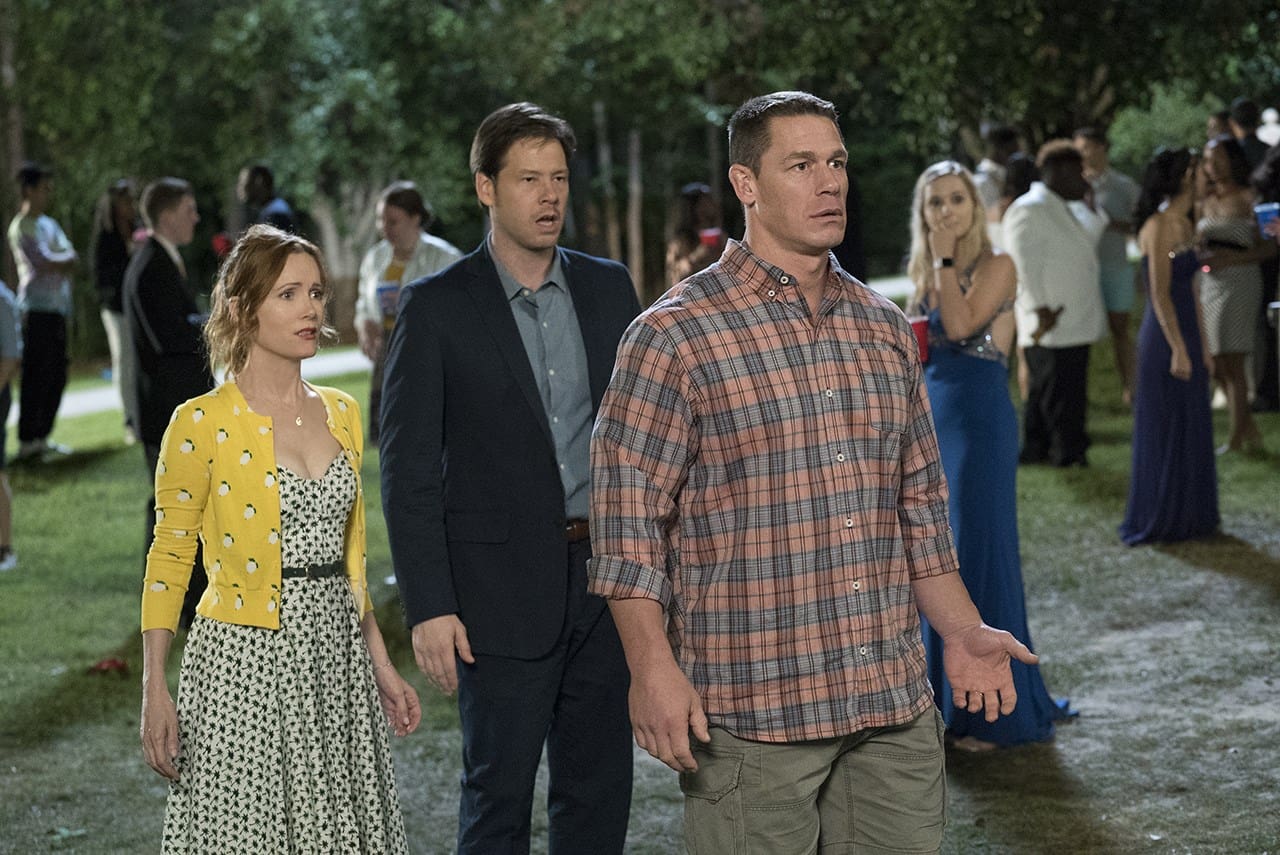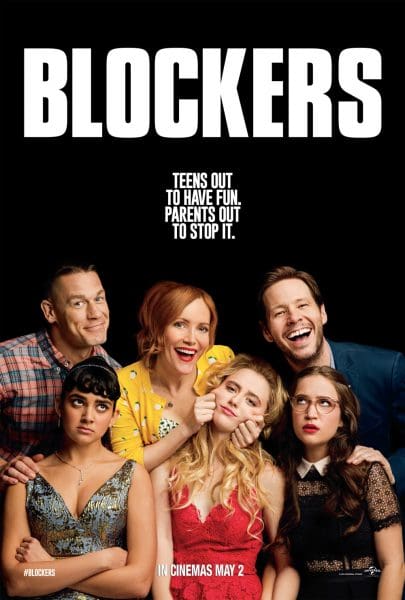
After catching the wonderfully hilarious premiere at SXSW of Blockers which I described as the “teen comedy 2018 needs,” I sat down with the film’s composer Mateo Messina to discuss what made the film tick and get an inside look at his work on Casual heading into its final season on Hulu along with his work with Jason Reitman.
I’m really excited to talk with you since Casual is one of my favorite shows on right now.
Nice!
So I’d love to pick your brain about that and of course, Blockers which unfortunately was so funny that I couldn’t hear most of the music.
I know! My wife was commented, “I could hardly hear your music!” I told her when you watch it without an audience you’ll hear the whole score, there’s so much laughter but there’s also jokes you missed in there. There’s a fair amount of jokes you missed.

I wrote in my review that I missed about 15 percent of the movie and I think your score, honestly didn’t hear until the last twenty minutes.
Well would have heard it early on, but you probably weren’t paying attention like [the parents] decide they’re going to cock block [their kids], that’s all big percussion *makes percussive noise*. When they’re running to the hotel, that’s all percussion. When they go into the prom, that’s all percussion. It’s there, but the point of it is to get you pumped up, not for you to go, “Oh, this is music.” And a lot of it is driving this big percussion.
That kinda seems like the theory that if you can notice a score, something’s wrong. Do you subscribe to that?
Absolutely. The job of music in film is to help people feel, help them empathize with those characters, and to stay out of the way. Give them the place to feel but never tell them what to feel. So it makes me happy that you didn’t notice all this big percussion but you had to have felt kinda like, “Oh shit, it’s on!” They’re all running out of the house and they’re gonna do it now. Or when they’re in the prom, it’s literally *makes music cue* and when Hunter turns around and clocks the kids as they’re walking in, I put in this big drop like *makes slow-motion sound*
Like a slow-motion sound.
Right! If you’re not noticing that, it’s done its job because it helped people feel. You heard it in the end because you heard all the sentimental stuff.
Right, so do you intentionally make people notice during scenes like that opposed to hiding in and intensifying action?
No, I mean, sometimes they will. Like Lisa in the bedroom and she walks in right before Julie shows up and she sees the heart and everything. I originally had a string orchestra, but I did piano and just made it intimate, really sentimental. But there’s there’s nothing else happening in that scene. There’s no dialogue, not anything. But for the majority of this film, it’s snappy and quick dialogue, so you’re really staying out of the way.
So I’ve noticed it seems your go-to, from your work on Juno and Casual in particular, is this off-kilter acoustic and piano. Where do you find the times to use that opposed to more traditional themes?
Just so you know, the score I did for this next film called Little Italy is an accordion, so I never want to limit. Every score I do is wildly different. I did this pilot that I used all analog-synth. So I go to different places when I want to. But this will speak to Casual, when I want people to feel really close to a character, I try to keep my instrumentation really minimal. And my whole theory behind Casual, is it’s kinda ridiculous, but my musicians come in the studio and I’m like, “Here we go, nobody tune!” No tuning allowed.
What happens is these instruments get out of tune a little bit. They feel kinda raw but could create an arrangement that sounds bad. I mean, I won’t let it go so far that it’s egregiously bad but just a little off-kilter. What’s beautiful about that is — and it’s not something you notice — but feel there’s something about this music that informs these characters and their brokenness.
Those characters, Tommy Dewey is really great at delivering snappy lines, but underneath it all, even underneath all his narcissism he’s just really broken trying to figure out how to move past his waffle maker and commit to a woman. And if I have a score on the outside that’s *makes Casual tune* and it’s really hip and cool, but then on the other side of it, it’s all being played with instruments that aren’t the right instruments. There’s nothing polished about it and to me, that’s my way of getting viewers into the characters.
Is that something you do exclusively for Casual then?
Well, that style’s exclusive to Casual. Like I wouldn’t do something out of tune for Blockers, it’s just not that kind of movie. It’s interesting, I look at the ways what will the picture hold? One of the executives at Universal, he and I were talking last night and he goes, “My god, sometimes just one cue can make such a difference. Your cue at the end when [Lisa] is holding her phone and saying goodbye to Julie, she walks to the car, and the cue just melted me. I got teary-eyed.” And I go, “Really!?” Before I even sent one thing to Kay (Cannon), I came at it about four different ways, and I said, “The whole time didn’t want to ever be saccharine” but that scene, the picture could hold way more sentimental music than the other scenes.
Now the closer I got to sentimental music was Mitchell and Kayla, and the scene right after with Sam and Hunter when she comes out. Those are these pretty sentimental moments, beautiful moments, and they’re intimate moments of dads and daughters. I could play a little bit more there but even there, don’t be saccharine, you can’t cross that line where it feels like a Hallmark moment. But with the scene on the phone, I could go there and it felt okay. I didn’t have to hold back.
Every comedy has different tones, and the same thing goes, how do you play those sentimental scenes? I mean, I describe this film as a 90-minute, hilarious chase scene because it’s always moving. So when I first sat down with Kay, I said, “Oh my gosh, this movie’s about big pace. Let’s keep it moving. There’s so much dialogue, I don’t want to be too melodic.” So I wrote a lot in percussion just to keep moving from place to place, and then when we got into the last reel, I could go into a lot more sentiment and those beautiful scenes which gave a lot of feeling and heart in the film.
Describing it as you do, a funny 90-minute action sequence, is this the most challenging work you’ve done?
No, not saying it wasn’t challenging. I had 32 different cues that some you get it right on the first time, sometimes on the third or fourth. I had one scene was so challenging though, the Hunter-Sam scene I think I was up to version 14. Kay was like, “I’m sorry! I know, it’s so hard, this one.” But we eventually found it.
But no, it wasn’t hard because Kay is smart and very funny. And she’s able to articulate herself. Not perfectly every time because she’s artful but for the most part she knows. Oh, I know! (After the premiere) my wife goes, “Every time you went to Angelica (the girl crush), it seemed loud.” I actually remember even before going into mix, I’m going, “Oh, this seems really up front. Shouldn’t it be more smoothed in and out? And [Kay] goes, “No, now we’re in Sam’s head as she’s looking at this crush.”
It was things like that which she understood what she wanted and it was a choice, it was subjective.
https://www.youtube.com/watch?v=cZ_QNWb9ztk
What about other characters themes? Did they all have some insight like that you gave for Sam?
What it was, there was the Blockers theme which was all percussion. There was what I called all the stings. I had so many stings. For when Kayla’s eyes get really big, there was just a ridiculous amount of them. I tried to stay as percussive as I could.
Julie and Lisa’s held the most sentiment because it was this mom having this hard time letting go. And Leslie (Greer) played Lisa so deftly played that line at the end, she’s so funny yet you could see all the vulnerability. So that was the character I could play more piano and when it came to Mitchell and Kayla, Mitchell has this super sentimental moment but that’s not him. So for him, I used just acoustic guitars and Hunter was actually electric guitars — He was everything, he was trumpets, he’s all over the place so I put in anything.
I put in accordion, I put in timpani, I put in trumpets, I put in acoustic guitars, I put in drums. He was such a hot mess, it was fun to write for that guy. And the scene at the end, it’s a sentimental scene, he’s got the ugly cry going. Here’s why comedy is probably the most challenging of all genres, but I love it…
For scoring?
 For scoring, but I bet even for acting. Hitting that tone is really difficult. The naked Marco Polo scene where they’re the house, I wrote a horror film cue because you have to feel the horror John Cena is feeling as he’s trapped between two naked people.
For scoring, but I bet even for acting. Hitting that tone is really difficult. The naked Marco Polo scene where they’re the house, I wrote a horror film cue because you have to feel the horror John Cena is feeling as he’s trapped between two naked people.
Playing that subtext is what informs the scene and what makes it funny. So comedy isn’t like a style, it’s a tone.
Your catalog is mostly comedy, why do you keep going back to it?
I just love comedy. My favorite movies growing up were Airplane, Family Vacation, Ghostbusters, you know. I mean, I’ve tried different genres, I definitely do dramas and I actually did a horror film for MGM just to try it. From a scoring perspective, it’s really fun but I just don’t like to see people get murdered.
I actually love all types of movies and so I’m not locked into comedy, but I understand them and it seems to be my expertise now for 15+ years, that’s almost all of what I’ve done. And comedy is about timing, it’s about pacing and it’s about tone, tone, tone. And then after all that, it’s about style.
Since you brought up Juno, you seem to be Jason Reitman’s go-to composer but you’re not on the credits for Tully. Did you write any additional music for that?
No, you know what’s funny, I’ve done music on every one of his films except Tully and may Labor Day. He has me doing weird things. Like he had me on Young Adult, he goes, “Can you make me Muzak (background/elevator music) versions of iconic 90s and rock hits?” He’s a really interesting filmmaker.
Having worked with someone as successful as Reitman, and even a showrunner like Zander Lehmann, what did Kay bring to the table for you as a first-time director?
One thing I immediately identified with Kay, ‘cause one of our first meetings she was talking about some re-writes, some re-shoots, and she was telling us about them and in the edit bay as we’re working on some of the scenes, and she’s basically pitching us what she’s going to be pitching Universal. And I was like, she obviously came up through Tina Fey. She’s so smart where she’s like “Yeah, this will be really funny but it’s just not worth it.
Some things that they shot for this were so funny and then she had to cut out because she goes, “It’s not serving the story. It’s funny. It’ll get a laugh but we already have [this other part].” I mean, you were there. How many times do you go to the theater and you hear, not just laughs but roars?
Kay really is a fascinating creator. Does she feel like a freshman director?
She doesn’t feel like a first time director at all. Technically she is a first time director, but I mean, she ran Girlboss which she show-ran. The showrunner is like the director of the directors. And beyond that, she spent years on 30 Rock. You could tell she knew what she was doing but you could tell she was super collaborative which was great. That’s the best way to be. She would ask good questions. She was always willing.
I said, “I know you’re thinking this but I want to try this,” she’s like, “Try that!” In the very beginning had actually done a whole different style of percussion where it was almost like a rowdy party. And I had actually said I want to have this kind of percussion meets the Beastie Boys for the parents. And we tried it, and Kay goes, “I really love this other stuff here. This other thing you tried, I don’t like it but I’m so grateful that you tried it. I actually like it, but it’s not as good as what this is for the film.”
She was adamant about, “Is this Mitchell? Is this Kayla? Is this serving them?” She’s not just serving the story and what’s going on but the characters and I always try to come from a character approach.
You can hear Mateo Messina’s score in Blockers this Friday in theaters everywhere.

